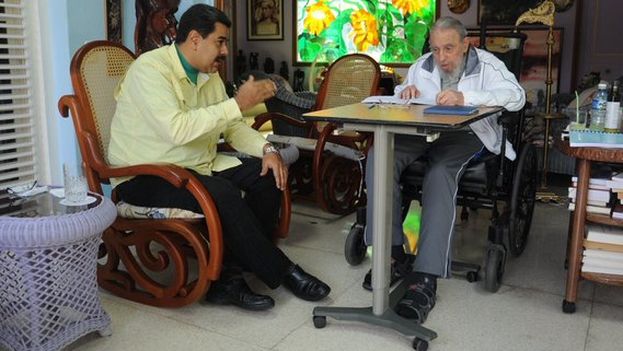
![]() 14ymedio, Havana, 28 March 2016 – A week after Barack Obama’s arrival in Cuba, the official press has published a “Reflection” by former Cuban president Fidel Castro, titled “Brother Obama,” but which contains strong criticisms of the US president. The text, often disjointed and scattered, is intended as a response to Obama’s speech in the Gran Teatro de la Habana, and in particular to his declaration that he wanted to leave behind, “the last vestiges of the Cold War in the Americas.”
14ymedio, Havana, 28 March 2016 – A week after Barack Obama’s arrival in Cuba, the official press has published a “Reflection” by former Cuban president Fidel Castro, titled “Brother Obama,” but which contains strong criticisms of the US president. The text, often disjointed and scattered, is intended as a response to Obama’s speech in the Gran Teatro de la Habana, and in particular to his declaration that he wanted to leave behind, “the last vestiges of the Cold War in the Americas.”
After an extensive introduction where Castro touches on topics such as the Spanish conquest of the island, the finding of gold, and tourist exploitation of natural landscapes, the Cuban leader lashes out against Obama’s words when he said that “Cuba, like the United States, was built in part by slaves brought here from Africa. Like the United States, the Cuban people can trace their heritage to both slaves and slave-owners.”
Castro claims that “the native populations [of Cuba] don’t exist at all in Obama’s mind,” and declares that “racial discrimination was swept away by the Revolution.” He also addresses the issue of Cuban participation in the war in Angola and holds against him what he calls “the support racist South Africa received from Reagan and Israel” and questions if Obama knows “about this history,” although “it is very doubtful that he knows absolutely nothing.”
“I wouldn’t even talk about this, unless I had the elemental duty to respond to Obama’s speech,” continues Castro, who describes the words of the United States president as “syrupy” when he suggested forgetting the past in these terms: “It is time, now, for us to leave the past behind. It is time for us to look forward to the future together — un futuro de esperanza [a future of hope].”
“I assume that each of us ran the risk of a heart attack,” sneers Castro, and reminds the occupant of the White House that “the merciless blockade has already lasted almost 60 years.” The allusions to the past that run throughout the Reflection, signed at “10:25 pm,” this Sunday, are summarized in the questions, “And what about those who have died in mercenary attacks on Cuban ships and ports, an airplane full of passengers blown up in mid-air, mercenary invasions, multiple acts of violence and of force?”
Obama’s historical speech, which was not published in full in the printed Cuban press, has generated sympathies among the population of the island. Minutes after Obama finished speaking, national television broadcast a stream of opinions opposing the words of the foreign president, from representatives of “civil society” even more official than that which listened in the Gran Teatro.
Fidel Castro’s article joins a string of articles in the official press that has sharply criticized Obama’s call to look to the future to advance relations between the two countries. As a counterpart, the former Cuban president suggests that he “reflect and not try, now, to elaborate theories about Cuban politics.” He confesses, however, that he “wished Obama’s conduct had been correct,” suggesting in this way that he was disappointed with the words of the island’s visitor.
In recent days, Obama’s speech has circulated extensively on alternative distribution networks, especially via e-mail and the well-known “weekly packet,” where a high resolution video of the speech is being distributed.
In his conclusion, Castro warns that “no one should make an allusion to the people of this noble and selfless country renouncing its glory and its rights, the spiritual richness it has gained with the development of education, science and culture.” And he ends with this affirmation that Cubans will appreciate: “We are capable of producing the food and material wealth that we need.”
It is worth remembering that, according to official figures, Cuba imports more than 80% of the food destined for the population’s “basic basket,” at a value of more than two billion dollars a year.
